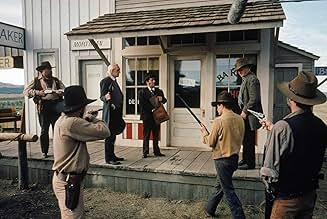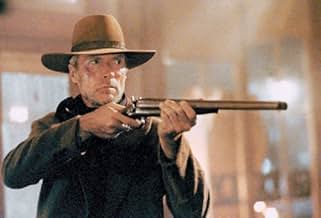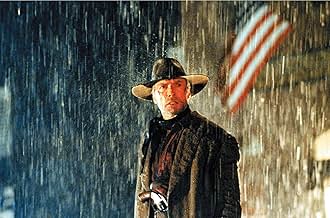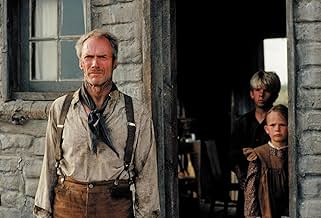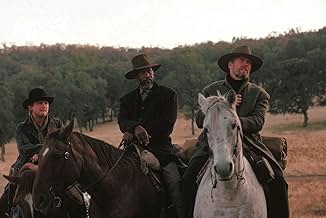Der Western-Revolverheld William Munny, der sich eigentlich aus seinem Geschäft zurückgezogen hat, übernimmt widerwillig noch einmal einen letzten Auftrag, bei dem ihm sein alter Partner und... Alles lesenDer Western-Revolverheld William Munny, der sich eigentlich aus seinem Geschäft zurückgezogen hat, übernimmt widerwillig noch einmal einen letzten Auftrag, bei dem ihm sein alter Partner und ein junger Mann helfen.Der Western-Revolverheld William Munny, der sich eigentlich aus seinem Geschäft zurückgezogen hat, übernimmt widerwillig noch einmal einen letzten Auftrag, bei dem ihm sein alter Partner und ein junger Mann helfen.
- 4 Oscars gewonnen
- 52 Gewinne & 47 Nominierungen insgesamt
- Little Sue
- (as Tara Dawn Frederick)
- Will Munny
- (as Shane Meier)
Zusammenfassung
Empfohlene Bewertungen
Eastwood puts in an astonishing performance as the retired killer Muny, saved from his life of thievery and murder by his late wife. Now, desperately trying to support his children with no income, he is tempted back to his killing ways by the bounty offered by the women of a brothel, one of whom's number has been savagely beaten and disfigured by a drunken ranch-hand.
The film follows Eastwood as he wrestles with his desire to honour his wife's memory and his need to feed his children by returning to the killer that, he fears, is his true nature. Meanwhile word of the bounty has spread and the events spiral out of control as the sheriff (Gene Hackman) deals with the guns for hire that ride into town.
While all the supporting cast are excellent Gene Hackman's Oscar winning performance even manages to eclipse Eastwoods as the brutal Sheriff. He beats one of the bounty hunters, English Bob (Richard Harris) almost to death and then explains to a journalist, in one of the film's stand out scenes, how men like he and Muny are so successful at killing. The mood moves from light banter to life threatening seriousness...and back again, with just one move of his head.
One of the greatest Westerns ever made? Certainly. Although the fact it's a western is really secondary. In truth it's a tale of the nature of evil and the nature of man. Eastwood uses the gap between the western myth and reality as an arena to play out his story and does so with consummate style.
Besides his now distinctive storytelling, there are numerous factors that make this a landmark Western. The ensemble cast could not have been stronger and there were no weak performances. The soundtrack accentuates the intended atmosphere of the director. A single detracting factor I could find only just qualifies as such. Munny's whimsical lines seemed a little contrived at times. They droned on like pale attempts to capture the Western era. But this is a consequence of the fact that they were more to do with the character of William Munny. He is after all a reformed killer with a now passive approach to people. Given this fact and also that it may have been distracting since it was so out of sync with what we are used to seeing from Eastwood, I still have to list it as a demerit on the account it slightly jerked me out of the story.
Hollywood producers have to satisfy audience preferences if investments are going to accrue profits. It is the nature of the beast. The action and more specifically the Western genre will stick to tried and tested formulas in order to guarantee audience acceptance. But every so often you get people who as a natural consequence of their unique character appeal are able to deliver a story that is outside these understandably restrictive boundaries. Eastwood is a cool individualist who normally plays characters who are not team players and do it their own way. His own way this time is to give the western genre a real story oozing characterization. A sort of ballad for the bad guy.
The ballads tune provides the story with a sad, introspective mood, within the opening and closing scenes. The opening scene depicts Munny in his new found life. He is cured of his wicked ways, helped by his dear, departed wife. But men are not willing to forgive or forget his monstrous deeds and in the final scenes he is who he has to be. Such is the sorrowful life of William Munny.
Westerns are typified by clearly defined goodies and baddies, but this is definitely not the case here. Eastwood and Freeman play reformed killers who find circumstances drawing them once again to their evil ways. But the older and wiser men now realize the value of life and come face to face with their troubled consciences. This is unlike their naïve, young partner who is attracted to the bravado image of the killer and relishes taking a man's life. This moral issue is virtually taboo for the classic western which glamorizes the lawlessness and the hero attraction of the gunslinger. This is also why in my view no-one besides Eastwood should have handled this movie.
Then we have the juiciest character of the movie superbly played by Gene Hackman worthy of the weight of every micro granule of his Oscar. He is the epitome of every hard-line lawman that ever was. The misguidance of the so called righteously empowered, swinging the hammer against evil for good. Hackman must have salivated when he read the script since there was obvious relish in his performance. All the better for the movie, and of course for Eastwood at the Oscars. By far the best performance and the others were good further underlining the talent of the man.
The antagonist of the movie is almost always the most complex and thus most interesting to analyze. His vain attempts at carpentry are his way of trying to appear to be a good man. There is purity in building ones own home and it is this wholesomeness that he wishes to capture. In that way his fellow citizens will see him as a simple man only wanting to lead a righteous life. But his inability as a carpenter is indicative of his depravity. He cannot be a good man. The source of his drive is anger and hatred. It is through this failing that we realize he cannot escape who he is.
Indeed it was not only the power of the script that gave the audience a spellbinding climax, but the talents of the actors. The actors' characterizations deliver the audience a spellbinding climax. It is only through Hackman's performance that we not only acknowledge his ending as inevitable, but also as deserving. We saw him as a man who virtually thought that he was righteously empowered to rid the earth of Munny and his kind What he thought was an honorable task was one rather of abuse and suppression. He became the baddie in the eyes of the audience and it is he who the audience wants to see justice served upon.
Munny was so weak throughout the movie that the eruption of his evil ways captured the interest of the audience. He transformed into the Eastwood of old the anti hero with a far more malevolent presence. Never could we have sensed this hatred and evil that we now see in William Munny. It is now that the frivolity of his mannerisms that I touched on in the beginning adds to the story as it helps to accentuate the turn in character. He is now only a killer, in it neither for money or fame as the writer nearly finds out to his tragic detriment.
Those who have only seen his Westerns of old or the 'Dirty Harry' movies may enter the cinema with expectations of such like will either be disappointed or pleasantly surprised. It is the atypical western and an unfamiliar portrayal by Eastwood. But I believe that most people will have the latter reaction. The differences are their strengths helped by the fact that it was a superbly crafted movie with a meaningful story and thought provoking lessons for our heroes and villains. Eastwood was directly suited to the roles that we identify him with, but it is exactly because of this suitability that he eases into the role of Munny. No mellowing with age, no identification with the mainstream, he has always done it his way, and he is so good that any way could be his way.
Clint Eastwood himself plays William Munny, a former gunslinger who is now living a peaceful life as a farmer with his two children. However, life is very difficult for Munny's family, as since the death of his wife the family has been facing financial problems. One day a young man calling himself "The Schofield Kid" (Jaimz Woolvett) appears looking for Munny. The Kid tells Munny about a bounty offered in the town of Big Whisky, and offers him the chance to join him as hired gun and split the reward between them. While Munny's days as a murderer are in the past, he decides to join him after thinking about the farm's problems, but not without calling his old friend Ned Logan (Morgan Freeman) to join them. However, Munny's past as a notorious thief and murderer will return to haunt him in this last mission, as the Kid shows a true and honest admiration for Munny's fame as a gunslinger, even when Munny himself considers his past as villainous.
While better known for his work in science fiction, David Webb Peoples' screenplay proves to be a very accurate description of life in the American west, particularly concerning the aspects of the uses and abuses of violence in that era. It is in fact the use of violence what comes as the main theme of the story, as Munny is escaping from his past's violence while the Kid is eagerly awaiting the next chance to prove his masculinity by the use of violence. The duality between man and myth is explored not only via the relationship between the Kid and Munny, but also in the shape of a character who writes novels about the wild west, and sees the figure of the gunslinger as an idolized modern hero. Peoples' screenplay is remarkably well written, as the many characters and their relationships are exhaustively explored, resulting in a character driven revisionism of the western, that in many ways criticizes the genre's origins as violent "Shoot 'em up" films.
Peoples' script is definitely the movie's backbone, but it is Eastwood's masterful direction what transforms this meditation of violence into a unique revision of the Western. With a gritty and realistic approach very in tone with the script, Eastwood portraits the Wild West without romanticism and leaving out the mythic aspects of the genre, taking the revisionism of the Western one step beyond. Using Peoples' script, Eastwood takes a critic view on the figure of the "hero" in Westerns, focusing on the image of the gunslinger and the use of violence to solve problems. Visually, Eastwood has crafted his most impressive movie since "Bird", with an extensive use of shadows and light in the excellent work of cinematography by Jack N. Green. Eastwood's style, originated by the influence of Sergio Leone and Don Siegel, and developed through many stages seems to finally have spawned its masterpiece in this film.
As William Munny, Clint Eastwood is simply perfect in what at first sight looks like an extension of his earlier "Man with no name" persona. William Munny has a name, and a past he wants to escape from, and Estwood captures the image of guilt and regret to the letter. This is easily one of his best roles to date. Morgan Freeman is also very good as Ned Logan, although like Jaimz Woolvett (who plays The Schofield Kid), gets easily overshadowed by Gene Hackman's powerful performance as Little Bill Daggett. Hackman completely owns every scene he is in, showcasing his enormous talent in a very dramatic role. The legendary Richard Harris has a small appearance as another aging gunslinger, English Bob, in very memorable scenes where he demonstrates why he is considered one of the best actors of his generation.
After starting his career playing a mythical hero in Leone's "Dollars" trilogy, it is actually fitting that is Eastwood who explores the figure of hero in his many movies. Ever since his first directed western, Eastwood showed an interest in the duality of the hero, taking a special interest in the archetype of hero portrayed in the classic 1953 Western, "Shane". Eastwood has explored this theme in many ways in the past: first as a true antihero ("High Plains Drifter"), then as a man becoming legend ("The Outlaw Josey Wales") and later as a true mythic hero ("Pale Rider"); all this culminates in "Unforgiven" as the ultimate demythologization of the concept, and his final ode to the Western genre. While the movie indeed feels a bit "preachy" at times, the story is devised in such a way that it never feels too heavy handed, as it unfolds nicely as a classic epic tale of the West.
Personally, I can't praise this movie enough, as it is easily one of the best Westerns done since Peckinpah's "The Wild Bunch", and required viewing not only for fans of the genre. While some consider it an "anti-Western", I think that with this movie, Eastwood's name can proudly stand along those of Ford, Hawks, Leone and Peckinpah as a master of the Western. "Unforgiven" is definitely Clint's masterpiece. 10/10
Clint Eastwood signed off from the Western genre with this magnificent 1992 picture, the appropriation and irony of which is in itself a majestic point of reference. After the script had been knocking around for nigh on twenty years (written by Blade Runner scribe David Webb Peoples), Eastwood seized the opportunity to play William Munney and lay bare the mythologies of the Wild West.
It's striking that the makers here have lured us in to being firmly on Munney's side, we are, incredibly, influenced by Eastwood's part in the history of the Western. In spite of Munney's obvious murky past (despicable crimes they be), we wait (and hope) for Munney to make a quip and way lay the bad guys - in fact salivating at the prospect is probably closer to the truth. So it's with enormous credit that Eastwood, and his magnificent cast and crew, manage to fuddle all our respective perceptions of the West and the characters we ourselves have aged with.
It's not for nothing that W.W. Beauchamp (Saul Rubinek) is one of the critical characters on show, this even though we didn't expect that to be the case. Beauchamp is a writer of penny pulpy novels that tell of derring-do heroics, gunslingers with a glint in their eye who deal death as some sort of heroic encore. This gives Unforgiven an excellent sleight of hand, for this West is grim and a destroyer of all illusions and it's not controversial to say that this is indeed a good thing.
Eastwood is greatly served by the actors around him, Morgan Freeman, Gene Hackman (winning the Best Supporting Actor Oscar for a script he turned down many years before!), Rubinek, Frances Fisher, Anna Thomson, Jaimz Woolvett and an incredible cameo from Richard Harris. Along with Hackman's win for his brutally tough portrayal of Sheriff "Little Bill" Daggett, Unforgiven also won Oscars for Eastwood for his clinically tight direction, Best Picture, Best Editing and it was nominated in another five categories. One of those nominations was for Jack Green's cinematography, which now, in this age of High Definition enhanced cinema, can be seen in all its wonderful glory. The Alberta location is magically transformed into the Western frontier, with the orange and brown hues a real treat for the eyes.
Ultimately though, Unforgiven is a lesson in adroit film making, where across the board it works so well. Why? Well because the man at the helm knows this genre inside out, he was after all the sole flag bearer for practically 25 years. He learnt from his peers, and thus Eastwood has crafted a thematically complex piece that for all its violence, debunking and melancholy pulse beats, is a film that is as beautiful as it is most assuredly stark. An incredible and true highlight of modern day cinema, regardless of being a genre fan or not. 10/10
Oscars Best Picture Winners, Ranked
Oscars Best Picture Winners, Ranked
Wusstest du schon
- WissenswertesDirector Clint Eastwood dedicated the film to directors and mentors Sergio Leone and Don Siegel. The final screen credit reads, "Dedicated to Sergio and Don."
- PatzerEnglish Bob says that no assassin would dare hold a gun to a monarch. There were, in fact, six assassination attempts made against Queen Victoria, and they were well known at the time. He certainly would have known about them. However, it should be noted that English Bob was mainly saying this to antagonize people and not necessarily because he truly believed it.
- Zitate
Little Bill Daggett: You'd be William Munny out of Missouri. Killer of women and children.
Will Munny: That's right. I've killed women and children. I've killed just about everything that walks or crawled at one time or another. And I'm here to kill you, Little Bill, for what you did to Ned.
- Crazy CreditsAt the end of the credits, there is caption reading, "Dedicated to Sergio and Don". This is a reference to late directors Sergio Leone (who directed Clint Eastwood in the Dollars trilogy) and Don Siegel (who directed Eastwood in Dirty Harry and Escape from Alcatraz).
- Alternative VersionenThe end credits in the current TV prints contain a black screen in addition the 2018 Warner Bros. Pictures plaster.
- VerbindungenFeatured in Clint Eastwood on Westerns (1992)
Top-Auswahl
- How long is Unforgiven?Powered by Alexa
- What is 'Unforgiven' about?
- Is "Unforgiven" based on a book?
- Is the character Will Munny based on a real person?
Details
Box Office
- Budget
- 14.400.000 $ (geschätzt)
- Bruttoertrag in den USA und Kanada
- 101.167.799 $
- Eröffnungswochenende in den USA und in Kanada
- 15.018.007 $
- 9. Aug. 1992
- Weltweiter Bruttoertrag
- 159.167.799 $
- Laufzeit2 Stunden 10 Minuten
- Farbe
- Seitenverhältnis
- 2.39 : 1
Zu dieser Seite beitragen






